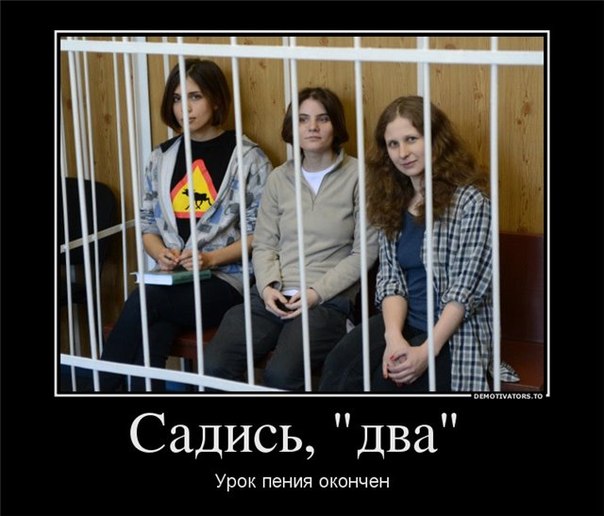Ross wrote:Frukt wrote:Ведущие мировые СМИ с повышенным вниманием следили за развитием событий с пусси. Занимая при этом явно предвзятую позицию в их поддержку.
Frukt, одкуда вы это знаете?
Я, например, ни разу не слышал о них, из какого-либо американского источника.
Изредка бывают публикации в каких-то газетах. Опять же, об этом я узнаю только из российских источников.
Очень очень сомневаюсь, что где-то регулярно о них писали, или, тем более, освещали по телевидению.
На НПР, например, довольно подробно обсуждали в нескольких программах, но только после решения суда.
Кстати, мне было любопытно послушать обсуждение (и мысленно с ним поспорить).
This weekend, a court in Moscow sentenced three women from a previously obscure punk band guilty of hooliganism. They got two years in prison and made Pussy Riot an international sensation. In the Washington Post today, columnist Anne Applebaum writes that for all the attention paid to the case, Madonna's was by far the most damaging, not because she's a serious political figure, but because she isn't.
ANNE APPLEBAUM: Thanks very much. Nice to be here.
CONAN: And the attention, you're saying, is once you get denounced by Madonna, you're in serious trouble because it's one thing to be attack by human rights groups, but it's another thing to be attacked in popular culture magazines.
APPLEBAUM: Well, in popular culture because it has all kinds of echoes in places that you don't expect, you know. And a totalitarian regime is aware of what Amnesty International or Human Rights Watch might say, and they're able to block particular websites. But once, you know, the Pussy Riot story has been everywhere, in newspapers in South Africa, in newspapers in the Middle East, in entertainment magazines, in gossip columns. Once you have that kind of attention to it, that it's very, very hard to control who reads it and who learns about it.
CONAN: And so you can't easily suggest to block the Amnesty International Web page if you want to, and Russia certainly blocks a lot of Web content. It's another thing to try to block Al-Jazeera.
APPLEBAUM: I mean, Al-Jazeera ran a Pussy Riot story, and all kinds of gossip columns, as I said, entertainment magazines that people are used to reading - people who aren't especially interested in politics are reading. It kind of changes the tone of the story, and it changes the places where you read about it, and it changes the kinds of people who are talking about it.
And this story, in particularly, is may be difficult for Putin because at some level, it's ridiculous that they should put three women in prison for two years for - you cannot like their form of protest or their kind of music or the way they're dress. But two years is a long prison sentence, and it begins to make the Russian state look silly, even in Al-Jazeera.
CONAN: And silly is not one anybody wants to look like. On the other hand, you point out they don't like to be compared with North Korea.
APPLEBAUM: No. Well, what the - as I wrote, the genius, if that's the correct word, of Putinism has always been that Putin had a very good understanding of what Russians really wanted. Russians might not have cared, you know, when they went abroad that people said, oh, Russia is not a very nice place or not very democratic. And they would argue that, well, we're a different kind of country and so on. But they really don't want to be a pariah state, and they really don't want to be, you know, thought - they don't want to have trouble traveling abroad. They don't want to have trouble having access to Western banks and Western hotels and Western businesses, Western companies. And they don't like the idea that Russia is not a part of the global political and economic system.
"If you thought that science was certain - well, that is just an error on your part." Richard Feynman

